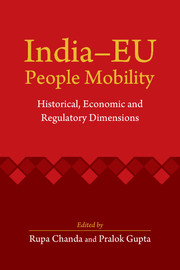Book contents
- Frontmatter
- Dedication
- Contents
- List of Tables, Figures and Boxes
- List of Abbreviations
- Preface
- Acknowledgements
- 1 India–EU People Mobility: Present Status and Policy Perspective
- 2 Economic Linkages and India–EU Mobility
- 3 Indian Diaspora in the EU
- 4 Goans in Portugal: History, Identity and Diaspora Linkages
- 5 Facilitating India–EU Mobility of IT Professionals
- 6 Movement of Indian Architects and Engineers: Prospects and Challenges in the EU
- 7 Mobility of Indian Legal Professionals to the EU: Understanding the EU's Regulatory Regime
- 8 Exploring India–EU Student Mobility
- 9 The Way Forward to a Strategic Engagement
- Contributors
- Index
8 - Exploring India–EU Student Mobility
Published online by Cambridge University Press: 05 January 2016
- Frontmatter
- Dedication
- Contents
- List of Tables, Figures and Boxes
- List of Abbreviations
- Preface
- Acknowledgements
- 1 India–EU People Mobility: Present Status and Policy Perspective
- 2 Economic Linkages and India–EU Mobility
- 3 Indian Diaspora in the EU
- 4 Goans in Portugal: History, Identity and Diaspora Linkages
- 5 Facilitating India–EU Mobility of IT Professionals
- 6 Movement of Indian Architects and Engineers: Prospects and Challenges in the EU
- 7 Mobility of Indian Legal Professionals to the EU: Understanding the EU's Regulatory Regime
- 8 Exploring India–EU Student Mobility
- 9 The Way Forward to a Strategic Engagement
- Contributors
- Index
Summary
Introduction
As the world moves towards a knowledge and service-driven economy, the demand for specialized human capital is ever increasing. Education has a pivotal role to play in addressing this need, by helping countries meet their labour market requirements and by providing suppliers of labour with access to job opportunities in the domestic as well as global labour market. It is, thus, no wonder that the internationalization of higher education has accompanied the growing participation of more and more countries in the world economy to meet the needs of both demandeurs and suppliers of skills. Internationalization of education is wide ranging, from the movement of education providers through the establishment of subsidiaries, franchises, campuses and twinning programmes across countries, to the delivery of education services through online distance programmes over the Internet, the cross-border movement of teachers, students and researchers, the standardization of curricula and pedagogies and the harmonization of standards across countries.
Out of these different contours of internationalization of higher education, cross-border student mobility occupies a significant place as it has economic, social and cultural ramifications for all countries involved and can play an important role in shaping bilateral economic, social and cultural relations between countries. Hence, it is not surprising that, today, student migration features as an agenda item in intergovernmental and multilateral discussions among key sending and receiving countries and has become a means to strengthen international relations. Cross-border provision of education services, including student mobility has also been brought under the purview of the General Agreement on Trade in Services (GATS) discussions in the WTO, indicating its significance in the multilateral context.
It is worth noting that both India and the European Union (EU) are important players in the context of international student mobility. India is the second most important source country for international students after China, while the EU is a key destination market for international students. European policies on higher education have progressively encouraged inward student mobility. The latter are not only a source of revenues in some EU countries but also a means to address their labour market requirements. Specifically, in the India–EU bilateral context, student mobility has featured as an important issue given its implications for bilateral trade, investment, scientific and technical relations.
- Type
- Chapter
- Information
- India–EU People MobilityHistorical, Economic and Regulatory Dimensions, pp. 183 - 219Publisher: Cambridge University PressPrint publication year: 2015



